#Power And Knowledge
Explore tagged Tumblr posts
Text
The Philosophy of Standpoint
The philosophy of standpoint, often referred to as standpoint theory, is a framework used primarily in feminist and critical theory to explore how knowledge and experience are shaped by social positions and power dynamics. It asserts that individuals' perspectives are influenced by their social and political contexts, particularly their positions within systems of power and oppression. Standpoint theory argues that marginalized or oppressed groups can offer unique and more accurate insights into social realities because their perspectives are shaped by experiences that are often overlooked or devalued by dominant groups.
Key Concepts:
Situated Knowledge: Standpoint theory posits that all knowledge is situated, meaning it is rooted in specific social contexts and power structures. This challenges the notion of objective, universal knowledge that is detached from the knower’s social identity.
Epistemic Privilege: A key idea in standpoint theory is that marginalized groups, because of their lived experiences of oppression, have an epistemic advantage in understanding certain aspects of social reality. For example, women might have a clearer understanding of gender relations than men because they experience gender-based oppression directly.
Standpoint as an Achievement: A standpoint is not simply given by one's social position but must be actively achieved through reflection, consciousness-raising, and collective struggle. This process involves critically examining and interpreting one's experiences within the broader social and political context.
Power and Knowledge: Standpoint theory emphasizes the relationship between power and knowledge production. It argues that dominant groups often shape what is considered legitimate knowledge, thereby marginalizing alternative perspectives that challenge the status quo.
Intersectionality: The philosophy of standpoint often intersects with intersectional theory, which recognizes that people experience oppression and privilege in multiple, overlapping ways (e.g., race, class, gender, sexuality). Thus, standpoint theory takes into account the complexity of identity and how it influences one's perspective.
The philosophy of standpoint challenges traditional notions of objectivity and universal knowledge by asserting that our social positions deeply influence how we perceive and understand the world. By recognizing and valuing the perspectives of marginalized groups, standpoint theory seeks to expose and address systemic inequalities in knowledge production and societal structures. It invites a more inclusive and reflective approach to understanding social reality, where diverse voices are heard and respected.
#philosophy#epistemology#knowledge#learning#education#chatgpt#metaphysics#ontology#Standpoint Theory#Feminist Philosophy#Critical Theory#Social Epistemology#Situated Knowledge#Epistemic Privilege#Intersectionality#Power And Knowledge#Marginalized Perspectives#Philosophy Of Identity#Social Constructivism#Knowledge Production
4 notes
·
View notes
Text
1963 Refrigerator 🤔
#pay attention#educate yourselves#educate yourself#knowledge is power#reeducate yourself#reeducate yourselves#think about it#think for yourselves#think for yourself#do your homework#do some research#do your own research#ask yourself questions#question everything#american history#history lesson
69K notes
·
View notes
Text
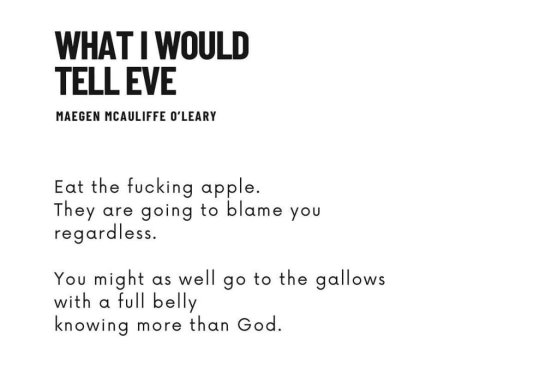

(h/t @jonsaremembers tysm!)
32K notes
·
View notes
Text

Jeremy Fitzgerald bravery in FNAF 2 worries Michael..
#myart#chloesimagination#comic#fnaf#five nights at freddy's#fnaf fanart#mangle#jeremy fitzgerald#michael afton#jeremike#fnaf 2#JEREMY RETURNS#JEREMY BACK!!#fr I didn’t mean to go so long without drawing him#other ideas just kept coming#but!! want to bring him back and draw him more often#Jeremy will never not be funny to me#here’s a guy with no known prior knowledge to Freddy’s#but dude just kills at being a night guard#it worries Michael for sure how casual he is about it#Jeremy just built different the bite was a mere flesh wound#dude lived he’s just too powerful#mango is so safe I promise 🩷#their bites are outta love!! 🩷🩷
6K notes
·
View notes
Text
"Fairytales don't tell children that dragons exist.
Children already know that dragons exist.
Fairytales tell children that dragons can be killed."
G.K. Chesterton.
#quote of the day#quote of today#g. k. chesterton#fairytales#childhood#children#teach your children#dragons#here be dragons#hic sunt dracones#here are lions#hic sunt leones#experience#knowledge#courage#empowerment#faith#have faith#inner strength#power#strength#think about it
7K notes
·
View notes
Text
Never Forget That The Only God Is Allah.
Allah is the Lord of the worlds and the Creator of everything. Allah is the only true God and Creator, and is the Lord of all worlds. His perfect design and control of the universe and its systems is indisputable - from the intricate sand castles to the delicate balance of the Earth's atmosphere. He has made night merge into day and created the perfect human body, with its complex brain and eyes which still surpasses modern technology. Every organ, component and process that enables life is created and controlled by Allah, and any flaw in His design would lead to life's destruction.
We must be thankful to our Creator for all He has given us, and always remember that He is the only Lord. Allah is the Lord and Creator of all things. He has created seven heavens and seven earths, and has the power and knowledge to encompass all things. He has created man to worship Him, and those who do so have taken hold of the firmest grip. Everything that happens is ultimately in Allah's hands, and He is the All-Penetrating and All-Aware.
Praise be to Him both in this world and the hereafter.
#Lord of the worlds#Creator#Allah#true God#perfect design#control of the universe#delicate balance#Earth's atmosphere#night merge into day#perfect human body#complex brain#surpasses modern technology#organ#component#process#life's destruction#Creator of all things#seven heavens#seven earths#power and knowledge#worship Him#firmest grip#All-Penetrating#All-Aware#praise#SoundCloud
0 notes
Text
Epic answer by Morgan Freeman 🤔
#pay attention#educate yourself#educate yourselves#wake the fuck up#wake up#do your own research#do your homework#do some research#exposing the truth#knowledge is power#reeducate yourself#ask yourself questions#question everything#morgan freeman#american history#history lesson#history#we're all one#united we stand#divided we fall
1K notes
·
View notes
Text
#hoodoo#voodoo#african spirituality#spiritual#spirituality#black power#knowledge#black knowledge#african#black magic
7K notes
·
View notes
Text

#truthwillsetyoufree#educate yourself#knowledge is power#educate yourselves#think for yourself#do your homework#health is wealth#pay attention
454 notes
·
View notes
Text
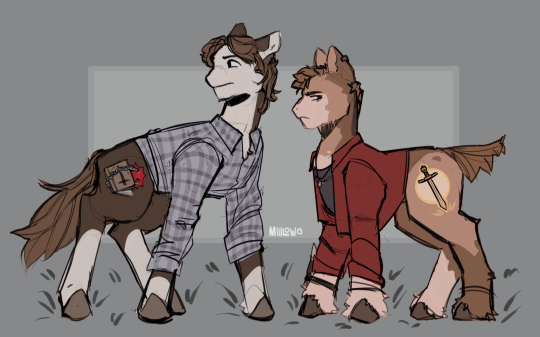
mom said it's my turn on the ponynatural (+rambling about their cutiemarks in the tags)
#spn#supernatural#sam winchester#dean winchester#spn fanart#supernatural fanart#milosartstuff#i wanted them both to have cutiemarks that they would derive the wrong meaning from#deans is pretty simple. its michaels sword. but i think he'd interpret it as just a soldier sort of thing. daddys blunt instrument etc#i also sort of wanted it to resemble a cross for obvious reasons#sams has more intricacy to it. hed see it as him escaping the hunting life#but i wanted it to be representative of him being manipulated into letting lucifer out of the cage and also giving into rubys whole demon-#-blood thing. uncovering the power/knowledge of the unholy#could also just be the fact hes the Lore Guy. he uncovers all of the Lore#wanted the upside down cross to parallel deans
679 notes
·
View notes
Text
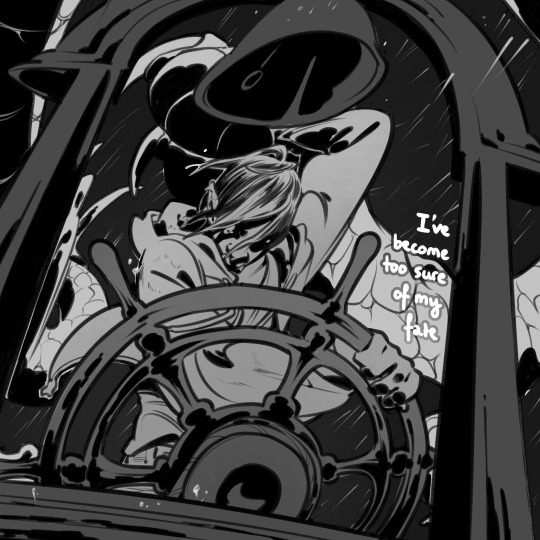

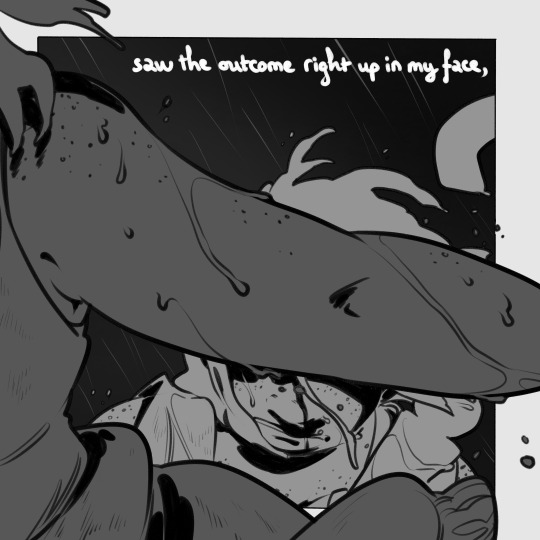
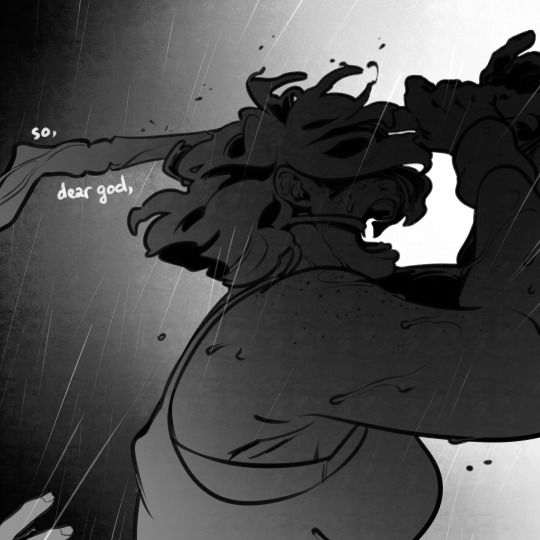

prayer of the day:
#dimension 20#fantasy high junior year#fhjy spoilers#fhjy k2#gorgug thistlespring#kristen applebees#cw: gore#and we're serious abt that warning this time! we mean that shit!#slowly getting some stuff I wanted to draw for the boat fight-finale combo that I couldnt draw in time bc I was doing huge comic#k2 is the Funniest thing to ever happen not bc she's a good bit (she is but thats not relevant here) but bc she let me have Clone Politics#insane shit. so wild that brennan has to send her to real life forever to keep himself safe from her (he isnt)#tbh I love cassandra's domain esp. for stories she truly is the deity for jackasses. k2 walking in here like#idk whats going on but I know it's not good! and by the power of this fucking guy I will unlearn that knowledge#beautiful. wish that were me#doubt as irrational stubborn hope... honestly inspired#wherever u are out there k2. hope ur doing well. going to college learning so much abt the world
828 notes
·
View notes
Text
The Philosophy of Ignorance
The philosophy of ignorance, also known as agnoiology, epistemology of ignorance, or agnotology, explores the nature, causes, and implications of ignorance. It delves into questions about the limits of human knowledge, the origins of ignorance, and the role of ignorance in shaping individual and societal beliefs and actions. Here are some key aspects of the philosophy of ignorance:
Nature of Ignorance: The philosophy of ignorance investigates the concept of ignorance itself, considering it as a lack of knowledge or understanding about a particular subject or topic. It examines different types of ignorance, such as factual ignorance (lack of specific information) and strategic ignorance (deliberate avoidance of knowledge).
Causes of Ignorance: Agnoiology explores the factors that contribute to ignorance, including cognitive biases, cultural influences, educational systems, social norms, and political agendas. It examines how ignorance can arise from limited access to information, misinformation, or disinformation propagated by various sources.
Epistemological Challenges: The philosophy of ignorance raises epistemological questions about the reliability of human cognition and the extent to which knowledge can be attained. It considers whether ignorance is an inherent aspect of human nature or a result of external factors that inhibit the acquisition of knowledge.
Ignorance and Power: Agnoiology explores the relationship between ignorance and power, recognizing that ignorance can be wielded as a tool of manipulation and control by those in positions of authority. It investigates how systems of oppression and domination perpetuate ignorance to maintain social hierarchies and inequalities.
Social and Cultural Dimensions: The philosophy of ignorance analyzes the role of ignorance in shaping cultural beliefs, collective attitudes, and societal norms. It examines how ignorance can be culturally constructed and maintained through social institutions, ideologies, and practices.
Ignorance and Ethics: Agnoiology raises ethical considerations about the moral responsibilities associated with ignorance. It questions whether individuals have an obligation to seek knowledge and overcome ignorance, especially when it perpetuates harm or injustice.
Epistemic Virtues and Vices: The philosophy of ignorance explores epistemic virtues (such as curiosity, open-mindedness, and intellectual humility) and vices (such as dogmatism, closed-mindedness, and intellectual arrogance) that influence how individuals engage with ignorance and knowledge.
Overcoming Ignorance: Agnoiology considers strategies for overcoming ignorance, including education, critical thinking, empirical inquiry, and the cultivation of epistemic virtues. It emphasizes the importance of fostering a culture of inquiry and skepticism to counteract ignorance and promote intellectual growth.
In summary, the philosophy of ignorance investigates the complex phenomenon of ignorance, addressing its conceptual, epistemological, social, and ethical dimensions. It offers insights into the nature of human cognition, the dynamics of power and knowledge, and the challenges of navigating an uncertain and complex world.
#philosophy#epistemology#knowledge#learning#chatgpt#education#ontology#metaphysics#ethics#psychology#Agnoiology#Epistemology of Ignorance#Agnotology#Factual Ignorance#Strategic Ignorance#Cognitive Biases#Social Construction of Ignorance#Power and Knowledge#Cultural Influences#Epistemic Virtues and Vices#Ethics of Ignorance#Overcoming Ignorance#ignorance#truth
2 notes
·
View notes
Text
Old Lighters 🤔
#pay attention#educate yourselves#educate yourself#knowledge is power#reeducate yourself#reeducate yourselves#think about it#think for yourselves#think for yourself#do your homework#do some research#do your own research#ask yourself questions#question everything#old lighters#lighters#antique#history lesson#history#american history#world history#ancient history
24K notes
·
View notes
Text

No good will come of this.
#educate yourself#knowledge is power#pay attention#educate yourselves#reeducate yourself#do your homework#reeducate yourselves#resist
359 notes
·
View notes
Text

FNAF movie Vanessa questions the power of remnant
#myart#chloesimagination#comic#michael afton#fnaf vanessa#vanessa afton#vanessa shelly#fnaf#fnaf movie#sister location#fnaf fanart#five nights at freddy's#Vanessa was just curious!! she wanted to power scale remnant BAHA#Michael only heard the cut off the head part and got spooked#which is so fair#I think Vanessa and Michael have general knowledge of remnant#but don’t know nearly enough as their dads#Michael knows a bit more through being covered in it#but still ah interesting question on how much can remnant can actually do#The alt universe Afton siblings content continues 🩵💜
3K notes
·
View notes
Text

Godzilla sez, "Stay In School, Kids, Because Learning Is SHEEEEEEEOOOOOONNNK!": A very inventive Godzilla little free library, Spokane, Washington.
3K notes
·
View notes